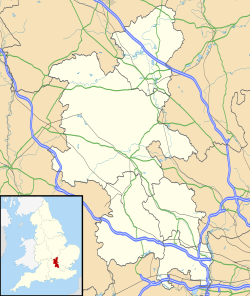History
The centre of the old hamlet is still identifiable at the junction of Penn Road and Forty Green Road where there remains a remnant of the old green from which the hamlet took part of its name. The name of the hamlet can be traced back to the 13th century. Knotty Green, or Nattuc as it was called in 1222, takes its name from Old English nattuc (rough grass of tussocks) that grew on the green.
There are several surviving buildings built in the 15th and 16th centuries, including timber-framed hall house Baylins Farm (or Beelings Manor) dating back to 1450. Opposite the cricket pitch stands Hutchins Barn, a 16th-century timbered house with a minstrels' gallery. Eghams Farm, built in Tudor times, is a private residence and stands on a path leading to Hogback Wood. [1]
In one corner of the small recreation area adjoining the cricket pitch, there is an old dew pond formerly used for sheep dipping and reputed to have been in existence for 400 years.
The development that followed the arrival of the railway in Beaconsfield in 1906 increased the population of the parish as a whole by nearly 50 per cent in five years, but it was confined to the Penn Road and Forty Green Road. There was still an obvious dividing line between the parishes of Penn and Beaconsfield, where the boundary stream ran under the Penn Road, and where Beaconsfield's pavement and new houses stopped abruptly. Development at this time included a house by the architect Charles Voysey, completed in 1907. Knotty Green also contains a 20th-century water garden at Juniper Hill.
This page is based on this
Wikipedia article Text is available under the
CC BY-SA 4.0 license; additional terms may apply.
Images, videos and audio are available under their respective licenses.


